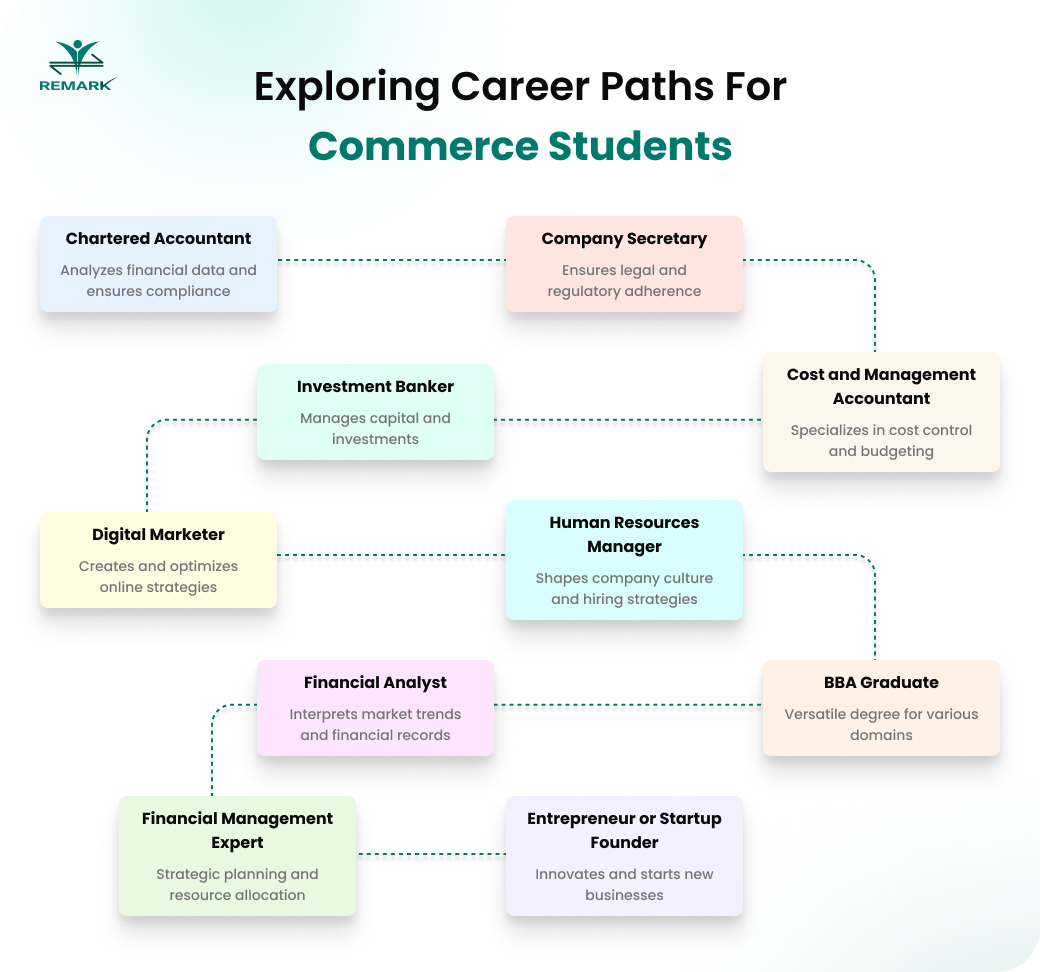Stepping out of 12th grade with a commerce background can feel like standing at the edge of a vast sea, full of ships sailing toward different futures. The good news? That sea is full of opportunity. The best jobs for commerce students don’t just offer a paycheck, they offer direction, growth, and purpose. Whether you dream of boardrooms, balance sheets, or branding campaigns, there’s a path just for you.
Today, commerce isn’t confined to accounting alone. With globalization and tech-driven economies, new-age job profiles are sprouting like never before. From financial whizzes to digital strategists, commerce graduates are ruling the roost. Let’s explore some of the best jobs for commerce students in India and what makes them tick.
1. Chartered Accountant (CA)
The evergreen, ever-demanded CA tops the chart of career options for commerce students. As a CA, you’ll analyze financial data, perform audits, manage taxes, and help companies stay compliant.
Average Salary: INR 6 to 8 LPA starting; can go up to INR 20+ LPA with experience.
Why it’s rewarding: High responsibility, excellent pay, and a revered status in the finance world. Many CAs go on to head finance departments or even launch their own consultancy firms.
Course Requirements: Clear CA Foundation, Intermediate, and Final levels conducted by ICAI. It’s a rigorous course, but the financial and professional rewards are well worth the effort.
2. Company Secretary (CS)
If laws, ethics, and corporate structure fascinate you, becoming a CS could be your calling. A CS ensures that a company adheres to legal and regulatory requirements, making them indispensable in the corporate governance system.
Average Salary: INR 4 to 6 LPA initially.
What stands out: Integral role in company governance and decision-making. Offers direct boardroom-level exposure, giving you insight into business strategy and compliance.
Eligibility: Complete CS Foundation, Executive, and Professional levels via ICSI. Ideal for students who enjoy law, documentation, and strategy.

3. Cost and Management Accountant (CMA)
CMAs are the financial strategists every company needs. Specializing in cost control, budgeting, and performance evaluation, this career path supports decision-making with financial insight.
Average Salary: INR 5 to 7 LPA starting.
Industries: Manufacturing, logistics, telecom, and public sector units.
Prospects: Growth into CFO roles or senior finance positions. The role demands an analytical mindset and knowledge of cost structures, making you a key decision influencer.
4. Investment Banker
If high-pressure, high-reward roles excite you, investment banking may be the jackpot. You’ll raise capital, manage mergers, assess IPOs, and handle large-scale investments.
Average Salary: INR 10 to 30 LPA.
Where you’ll work: Investment firms, banks, global financial institutions.
Skills Required: Analytical thinking, financial modelling, and risk analysis. Many top executives in finance start as investment bankers due to the high learning curve and exposure.
5. Digital Marketer
A modern role for commerce students with a creative bent. Digital marketers create and optimize online strategies, including content, SEO, paid campaigns, and analytics.
Average Salary: INR 3 to 8 LPA.
Career Path: Start as an executive and move toward roles like Digital Marketing Manager or Strategist.
Specializations: Social media, email marketing, content strategy, analytics. The demand for skilled digital marketers is soaring as businesses shift online.
6. Human Resources (HR) Manager
HR managers are critical to shaping company culture, hiring, and retention strategies. This role offers the opportunity to work closely with every department.
Average Salary: INR 6 to 10 LPA.
Recommended Courses: BBA in HR, MBA in HR.
Growth: You can eventually become a CHRO or start your own HR consulting firm. Human resource management offers meaningful work, especially for those who enjoy people-oriented roles.
7. Financial Analyst
A high-demand profession for commerce graduates who love data. Analysts help businesses make informed financial decisions by interpreting market trends and financial records.
Average Salary: INR 4 to 9 LPA.
Top Employers: Investment firms, MNCs, and consulting companies.
Tools Needed: Excel, Python (for analytics), Tableau. It’s a career that builds core analytical skills and opens doors to finance leadership roles.
8. Bachelor of Business Administration (BBA) Graduate
A BBA is a versatile degree that serves as a stepping stone into multiple domains including finance, marketing, HR, and entrepreneurship.
Best Courses after 12th Commerce: BBA, B.Com (Hons), BA Economics, BMS.
Top recruiters: Startups, tech firms, FMCGs, consulting firms.
Next Step: Follow up with an MBA for leadership roles. This pathway suits those who prefer managerial and strategic thinking roles.
9. Financial Management Expert
This role involves strategic planning, resource allocation, and financial performance evaluation. Suitable for professionals aiming for CFO or Director-level roles.
Average Salary: INR 8 to 18 LPA.
Ideal Path: CA/CMA/MBA in Finance.
Relevance: Every major organization needs skilled financial managers. It’s one of the most respected positions in corporate finance.
10. Entrepreneur or Startup Founder
If innovation runs in your veins, starting your own business could be your dream path. Commerce gives you a solid foundation in market and cost analysis.
Potential: Unlimited growth and earning opportunities.
Needs: Business plan, market knowledge, risk-taking ability.
Support: Many government schemes support young entrepreneurs today. This career is all about passion, vision, and execution.
Unique Career Options in Commerce
Commerce isn’t all balance sheets. Some career options can add a twist to your journey:
- Data Analyst: Combine commerce with data analytics for powerful insights.
- Forensic Accountant: Detects fraud and financial irregularities.
- Stock Market Trader: Trade stocks, currencies, and derivatives.
- E-commerce Specialist: Build strategies for online retail platforms.
- CSR Manager: Manage corporate social responsibility initiatives.
These careers offer high salary potential and the thrill of doing something different. They also allow you to blend technical skills with your understanding of business and society.
Why Choosing the Right Path Matters
Career confusion is real. That’s why mapping out a strong career path early on can save you from costly detours. The commerce stream offers a spectrum of possibilities if you know where to look.
Tips to Navigate Your Journey:
- Reflect on what excites you
- Seek internships to gain hands-on experience
- Speak to professionals already in the field
- Follow market demands and emerging trends
- Stay open to continuous learning
Choosing the right path means better focus, faster growth, and more satisfaction in your work life. Align your passion with your profession.
The Power of Courses after 12th Commerce
What you choose to study post-12th shapes your career trajectory. Here are the top courses after 12th Commerce that unlock incredible opportunities:
- B.Com (Hons.): A solid choice for finance and commerce basics
- CA/CS/CMA: Professional credentials with nationwide demand
- BBA: Perfect for business and management aspirants
- Bachelor’s in Economics: For research and data-driven roles
- Diploma in Digital Marketing: Short, focused, and high-impact
- Foreign Language with Commerce: Adds international employability
Each course caters to a different interest and ambition. Choose wisely, based on your skills and long-term career goals.
Staying Updated with Industry Trends
Commerce evolves faster than you can say “inflation.” Staying updated with industry trends is your secret weapon to stay relevant and competitive

Frequently Asked Questions (FAQ)
01. What are the best jobs for commerce students after the 12th?
Chartered Accountant, Company Secretary, Digital Marketer, Financial Analyst, and HR Manager are among the top roles with great scope and pay. These roles provide financial stability, opportunities for growth, and room for specialization.
02.Which course is best after 12th commerce?
CA, CS, CMA, B.Com (Hons), and BBA are highly popular and offer strong career foundations. Choose based on your interest—whether it’s in accounting, business, or legal frameworks.
03.What are some unique career options in commerce?
Forensic accountants, CSR Managers, Data Analyst, and E-commerce Expert are unique yet emerging options. They mix innovation with impact and often come with excellent salary packages.
04.Is commerce a good stream for high-salary jobs?
Yes. Roles like Investment Banker, CA, and Financial Manager offer high salaries and strong career growth. With the right credentials, commerce can be as lucrative as any other stream.
05.How can I become an investment banker after commerce?
Pursue a degree in finance or BBA, followed by an MBA in Finance or relevant certifications. Internships and networking in investment firms also help kickstart your career.
06. What’s the difference between CA and CMA?
CA focuses on audits, taxation, and compliance; CMA is more about cost control and management accounting. Your choice depends on whether you prefer external audits or internal strategy.
07. What is the scope of digital marketing in commerce?
Digital marketing is booming and welcomes commerce graduates for roles in SEO, content, and analytics. The blend of creativity and numbers makes it perfect for those with a flair for communication.
08. Can I pursue law after commerce?
Yes, you can pursue a 5-year integrated law course like B.Com LLB. It combines business acumen with legal knowledge, perfect for corporate legal careers.
09. Is BBA better than B.Com?
BBA is ideal for management and business roles; B.Com is broader and more finance-focused. Both have merit, so base your choice on where your interest lies.
10. How important is staying updated with industry trends?
Crucial. Trends dictate demand. Whether it’s fintech, e-commerce, or sustainability, staying updated keeps you relevant. It also helps you pivot or specialize when needed.
How to Stay Ahead:
- Read business news daily
- Join LinkedIn communities and follow thought leaders
- Attend webinars and workshops
- Take short online courses every 3–6 months
Industry awareness enhances employability and prepares you for leadership. It also helps you identify where the market is heading, giving you the foresight to pivot smartly.
Continuous Learning: The Career Catalyst
Gone are the days when a single degree could fuel an entire career. Today, employers love professionals who continuously update their skills.
Learning Tools: Coursera, Udemy, Skillshare, Khan Academy, Harvard Online
Must-have Skills for Commerce Students:
- Communication & Presentation
- Financial Management
- Excel & Data Interpretation
- Business Analytics
- Ethics and Corporate Governance
These skills future-proof your career and give you a strong edge in job interviews, appraisals, and promotions.
Exploring Global Opportunities
Commerce students today are no longer confined to domestic job markets. With degrees and skills in accounting, finance, and marketing, global avenues are wide open. Countries like Canada, Australia, and the UAE actively recruit commerce professionals in sectors like banking, taxation, auditing, and digital commerce.
Tips for Going Global:
- Acquire certifications like ACCA or CPA
- Learn about international tax laws and business regulations
- Master English fluency and communication skills
- Build an international portfolio or LinkedIn presence
The global stage offers diversity, better pay scales, and unmatched learning experiences. If wanderlust meets ambition, consider making the world your workplace.
Role of Internships in Shaping a Commerce Career
Internships are the bridge between classroom learning and corporate realities. They expose you to real-life business situations and help refine your interests. For commerce students, interning at a financial firm, digital marketing agency, HR department, or even a startup can offer invaluable insights.
Benefits of Internships:
- Build practical skills
- Enhance your resume
- Network with professionals
- Test different job roles before finalizing a career
Many full-time jobs begin as internships. So start early, be proactive, and use internships as stepping stones toward a rewarding career.
Conclusion
The commerce stream is more dynamic than ever, offering something for every ambition. Whether you want to lead boardrooms, decode markets, or build brands, your background gives you an edge. And in this journey, having the right tools matters.
Remark by Visko HR is one such platform that empowers commerce students with AI-driven mock interviews, resume tools, and job-matching features. When the future calls, you need more than dreams—you need direction. And Remark helps deliver just that.
